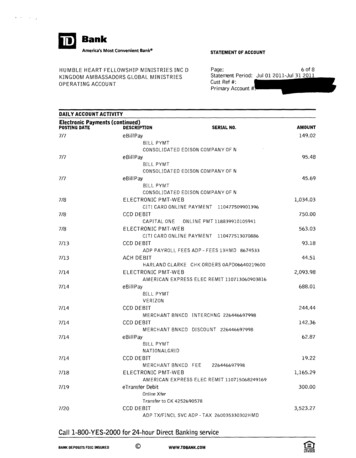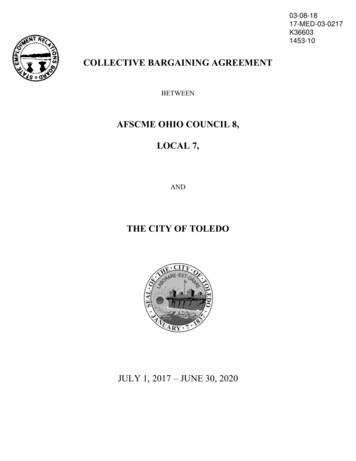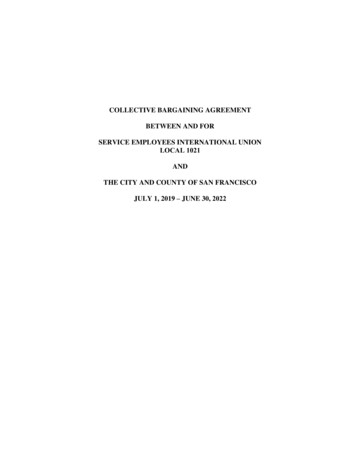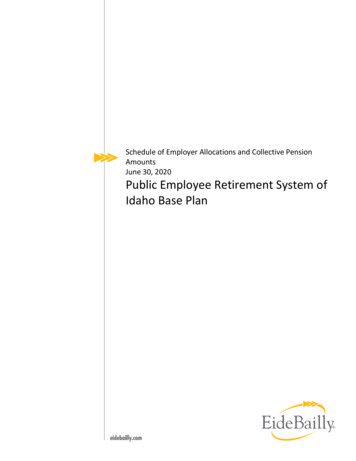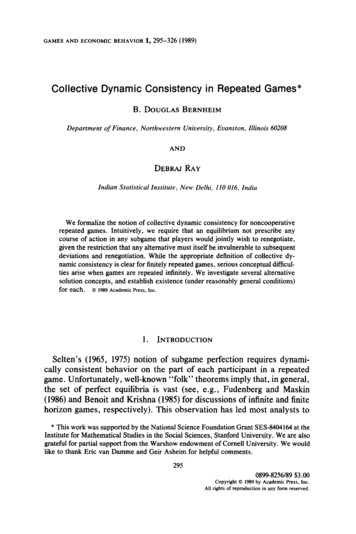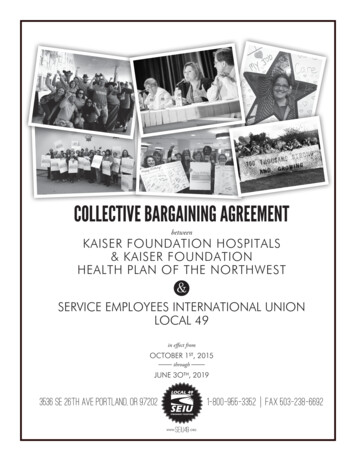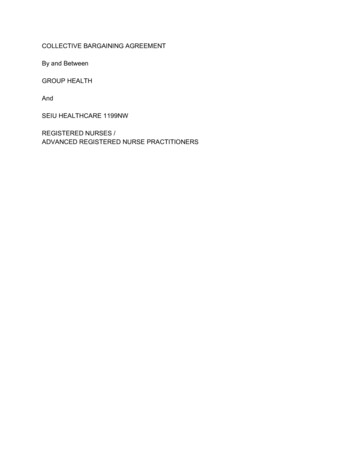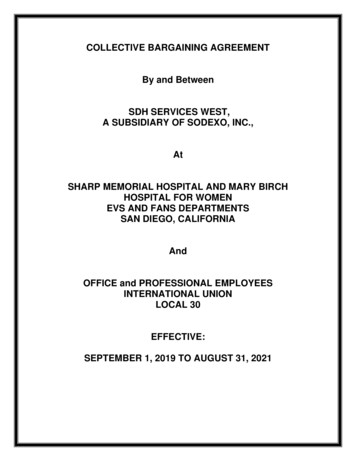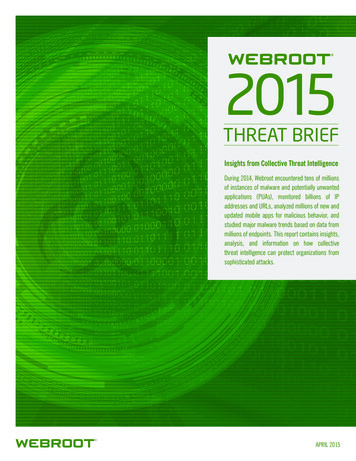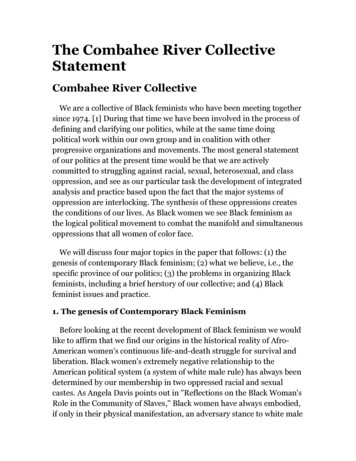
Transcription
The Combahee River CollectiveStatementCombahee River CollectiveWe are a collective of Black feminists who have been meeting togethersince 1974. [1] During that time we have been involved in the process ofdefining and clarifying our politics, while at the same time doingpolitical work within our own group and in coalition with otherprogressive organizations and movements. The most general statementof our politics at the present time would be that we are activelycommitted to struggling against racial, sexual, heterosexual, and classoppression, and see as our particular task the development of integratedanalysis and practice based upon the fact that the major systems ofoppression are interlocking. The synthesis of these oppressions createsthe conditions of our lives. As Black women we see Black feminism asthe logical political movement to combat the manifold and simultaneousoppressions that all women of color face.We will discuss four major topics in the paper that follows: (1) thegenesis of contemporary Black feminism; (2) what we believe, i.e., thespecific province of our politics; (3) the problems in organizing Blackfeminists, including a brief herstory of our collective; and (4) Blackfeminist issues and practice.1. The genesis of Contemporary Black FeminismBefore looking at the recent development of Black feminism we wouldlike to affirm that we find our origins in the historical reality of AfroAmerican women's continuous life-and-death struggle for survival andliberation. Black women's extremely negative relationship to theAmerican political system (a system of white male rule) has always beendetermined by our membership in two oppressed racial and sexualcastes. As Angela Davis points out in "Reflections on the Black Woman'sRole in the Community of Slaves," Black women have always embodied,if only in their physical manifestation, an adversary stance to white male
rule and have actively resisted its inroads upon them and theircommunities in both dramatic and subtle ways. There have always beenBlack women activists—some known, like Sojourner Truth, HarrietTubman, Frances E. W. Harper, Ida B. Wells Barnett, and Mary ChurchTerrell, and thousands upon thousands unknown—who have had ashared awareness of how their sexual identity combined with their racialidentity to make their whole life situation and the focus of their politicalstruggles unique. Contemporary Black feminism is the outgrowth ofcountless generations of personal sacrifice, militancy, and work by ourmothers and sisters.A Black feminist presence has evolved most obviously in connectionwith the second wave of the American women's movement beginning inthe late 1960s. Black, other Third World, and working women have beeninvolved in the feminist movement from its start, but both outsidereactionary forces and racism and elitism within the movement itselfhave served to obscure our participation. In 1973, Black feminists,primarily located in New York, felt the necessity of forming a separateBlack feminist group. This became the National Black FeministOrganization (NBFO).Black feminist politics also have an obvious connection to movementsfor Black liberation, particularly those of the 1960s and I970s. Many ofus were active in those movements (Civil Rights, Black nationalism, theBlack Panthers), and all of our lives Were greatly affected and changedby their ideologies, their goals, and the tactics used to achieve theirgoals. It was our experience and disillusionment within these liberationmovements, as well as experience on the periphery of the white maleleft, that led to the need to develop a politics that was anti-racist, unlikethose of white women, and anti-sexist, unlike those of Black and whitemen.There is also undeniably a personal genesis for Black Feminism, thatis, the political realization that comes from the seemingly personalexperiences of individual Black women's lives. Black feminists and manymore Black women who do not define themselves as feminists have all
experienced sexual oppression as a constant factor in our day-to-dayexistence. As children we realized that we were different from boys andthat we were treated differently. For example, we were told in the samebreath to be quiet both for the sake of being "ladylike" and to make usless objectionable in the eyes of white people. As we grew older webecame aware of the threat of physical and sexual abuse by men.However, we had no way of conceptualizing what was so apparent to us,what we knew was really happening.Black feminists often talk about their feelings of craziness beforebecoming conscious of the concepts of sexual politics, patriarchal rule,and most importantly, feminism, the political analysis and practice thatwe women use to struggle against our oppression. The fact that racialpolitics and indeed racism are pervasive factors in our lives did not allowus, and still does not allow most Black women, to look more deeply intoour own experiences and, from that sharing and growing consciousness,to build a politics that will change our lives and inevitably end ouroppression. Our development must also be tied to the contemporaryeconomic and political position of Black people. The post World War IIgeneration of Black youth was the first to be able to minimally partake ofcertain educational and employment options, previously closedcompletely to Black people. Although our economic position is still atthe very bottom of the American capitalistic economy, a handful of ushave been able to gain certain tools as a result of tokenism in educationand employment which potentially enable us to more effectively fightour oppression.A combined anti-racist and anti-sexist position drew us togetherinitially, and as we developed politically we addressed ourselves toheterosexism and economic oppression under capItalism.2. What We BelieveAbove all else, Our politics initially sprang from the shared belief thatBlack women are inherently valuable, that our liberation is a necessitynot as an adjunct to somebody else's may because of our need as humanpersons for autonomy. This may seem so obvious as to sound simplistic,
but it is apparent that no other ostensibly progressive movement hasever consIdered our specific oppression as a priority or worked seriouslyfor the ending of that oppression. Merely naming the pejorativestereotypes attributed to Black women (e.g. mammy, matriarch,Sapphire, whore, bulldagger), let alone cataloguing the cruel, oftenmurderous, treatment we receive, Indicates how little value has beenplaced upon our lives during four centuries of bondage in the Westernhemisphere. We realize that the only people who care enough about usto work consistently for our liberation are us. Our politics evolve from ahealthy love for ourselves, our sisters and our community which allowsus to continue our struggle and work.This focusing upon our own oppression is embodied in the concept ofidentity politics. We believe that the most profound and potentially mostradical politics come directly out of our own identity, as opposed toworking to end somebody else's oppression. In the case of Black womenthis is a particularly repugnant, dangerous, threatening, and thereforerevolutionary concept because it is obvious from looking at all thepolitical movements that have preceded us that anyone is more worthyof liberation than ourselves. We reject pedestals, queenhood, andwalking ten paces behind. To be recognized as human, levelly human, isenough.We believe that sexual politics under patriarchy is as pervasive inBlack women's lives as are the politics of class and race. We also oftenfind it difficult to separate race from class from sex oppression becausein our lives they are most often experienced simultaneously. We knowthat there is such a thing as racial-sexual oppression which is neithersolely racial nor solely sexual, e.g., the history of rape of Black women bywhite men as a weapon of political repression.Although we are feminists and Lesbians, we feel solidarity withprogressive Black men and do not advocate the fractionalization thatwhite women who are separatists demand. Our situation as Black peoplenecessitates that we have solidarity around the fact of race, which whitewomen of course do not need to have with white men, unless it is their
negative solidarity as racial oppressors. We struggle together with Blackmen against racism, while we also struggle with Black men aboutsexism.We realize that the liberation of all oppressed peoples necessitates thedestruction of the political-economic systems of capitalism andimperialism as well as patriarchy. We are socialists because we believethat work must be organized for the collective benefit of those who dothe work and create the products, and not for the profit of the bosses.Material resources must be equally distributed among those who createthese resources. We are not convinced, however, that a socialistrevolution that is not also a feminist and anti-racist revolution willguarantee our liberation. We have arrived at the necessity for developingan understanding of class relationships that takes into account thespecific class position of Black women who are generally marginal in thelabor force, while at this particular time some of us are temporarilyviewed as doubly desirable tokens at white-collar and professionallevels. We need to articulate the real class situation of persons who arenot merely raceless, sexless workers, but for whom racial and sexualoppression are significant determinants in their working/economiclives. Although we are in essential agreement with Marx's theory as itapplied to the very specific economic relationships he analyzed, weknow that his analysis must be extended further in order for us tounderstand our specific economic situation as Black women.A political contribution which we feel we have already made is theexpansion of the feminist principle that the personal is political. In ourconsciousness-raising sessions, for example, we have in many ways gonebeyond white women's revelations because we are dealing with theimplications of race and class as well as sex. Even our Black women'sstyle of talking/testifying in Black language about what we haveexperienced has a resonance that is both cultural and political. We havespent a great deal of energy delving into the cultural and experientialnature of our oppression out of necessity because none of these mattershas ever been looked at before. No one before has ever examined themultilayered texture of Black women's lives. An example of this kind of
revelation/conceptualization occurred at a meeting as we discussed theways in which our early intellectual interests had been attacked by ourpeers, particularly Black males. We discovered that all of us, because wewere "smart" had also been considered "ugly," i.e., "smart-ugly." "Smartugly" crystallized the way in which most of us had been forced todevelop our intellects at great cost to our "social" lives. The sanctions Inthe Black and white communities against Black women thinkers iscomparatively much higher than for white women, particularly onesfrom the educated middle and upper classes.As we have already stated, we reject the stance of Lesbian separatismbecause it is not a viable political analysis or strategy for us. It leaves outfar too much and far too many people, particularly Black men, women,and children. We have a great deal of criticism and loathing for whatmen have been socialized to be in this society: what they support, howthey act, and how they oppress. But we do not have the misguidednotion that it is their maleness, per se—i.e., their biological maleness—that makes them what they are. As BIack women we find any type ofbiological determinism a particularly dangerous and reactionary basisupon which to build a politic. We must also question whether Lesbianseparatism is an adequate and progressive political analysis andstrategy, even for those who practice it, since it so completely denies anybut the sexual sources of women's oppression, negating the facts of classand race.3. Problems in Organizing Black FeministsDuring our years together as a Black feminist collective we haveexperienced success and defeat, joy and pain, victory and failure. Wehave found that it is very difficult to organize around Black feministissues, difficult even to announce in certain contexts that we are Blackfeminists. We have tried to think about the reasons for our difficulties,particularly since the white women's movement continues to be strongand to grow in many directions. In this section we will discuss some ofthe general reasons for the organizing problems we face and also talkspecifically about the stages in organizing our own collective.
The major source of difficulty in our political work is that we are notjust trying to fight oppression on one front or even two, but instead toaddress a whole range of oppressions. We do not have racial, sexual,heterosexual, or class privilege to rely upon, nor do we have even theminimal access to resources and power that groups who possess anyoneof these types of privilege have.The psychological toll of being a Black woman and the difficulties thispresents in reaching political consciousness and doing political work cannever be underestimated. There is a very low value placed upon Blackwomen's psyches in this society, which is both racist and sexist. As anearly group member once said, "We are all damaged people merely byvirtue of being Black women." We are dispossessed psychologically andon every other level, and yet we feel the necessity to struggle to changethe condition of all Black women. In "A Black Feminist's Search forSisterhood," Michele Wallace arrives at this conclusion:We exists as women who are Black who are feminists, each stranded for themoment, working independently because there is not yet an environment in thissociety remotely congenial to our struggle—because, being on the bottom, we wouldhave to do what no one else has done: we would have to fight the world. [2]Wallace is pessimistic but realistic in her assessment of Blackfeminists' position, particularly in her allusion to the nearly classicisolation most of us face. We might use our position at the bottom,however, to make a clear leap into revolutionary action. If Black womenwere free, it would mean that everyone else would have to be free sinceour freedom would necessitate the destruction of all the systems ofoppression.Feminism is, nevertheless, very threatening to the majority of Blackpeople because it calls into question some of the most basic assumptionsabout our existence, i.e., that sex should be a determinant of powerrelationships. Here is the way male and female roles were defined in aBlack nationalist pamphlet from the early 1970s:
We understand that it is and has been traditional that the man is the head of thehouse. He is the leader of the house/nation because his knowledge of the world isbroader, his awareness is greater, his understanding is fuller and his application ofthis information is wiser. After all, it is only reasonable that the man be the head ofthe house because he is able to defend and protect the development of his home.Women cannot do the same things as men—they are made by nature to functiondifferently. Equality of men and women is something that cannot happen even in theabstract world. Men are not equal to other men, i.e. ability, experience or evenunderstanding. The value of men and women can be seen as in the value of gold andsilver—they are not equal but both have great value. We must realize that men andwomen are a complement to each other because there is no house/family without aman and his wife. Both are essential to the development of any life. [3]The material conditions of most Black women would hardly lead themto upset both economic and sexual arrangements that seem to representsome stability in their lives. Many Black women have a goodunderstanding of both sexism and racism, but because of the everydayconstrictions of their lives, cannot risk struggling against them both.The reaction of Black men to feminism has been notoriously negative.They are, of course, even more threatened than Black women by thepossibility that Black feminists might organize around our own needs.They realize that they might not only lose valuable and hardworkingallies in their struggles but that they might also be forced to change theirhabitually sexist ways of interacting with and oppressing Black women.Accusations that Black feminism divides the Black struggle are powerfuldeterrents to the growth of an autonomous Black women's movement.Still, hundreds of women have been active at different times duringthe three-year existence of our group. And every Black woman whocame, came out of a strongly-felt need for some level of possibility thatdid not previously exist in her life.When we first started meeting early in 1974 after the NBFO firsteastern regional conference, we did not have a strategy for organizing,or even a focus. We just wanted to see what we had. After a period ofmonths of not meeting, we began to meet again late in the year and
started doing an intense variety of consciousness-raising. Theoverwhelming feeling that we had is that after years and years we hadfinally found each other. Although we were not doing political work as agroup, individuals continued their involvement in Lesbian politics,sterilization abuse and abortion rights work, Third World Women'sInternational Women's Day activities, and support activity for the trialsof Dr. Kenneth Edelin, Joan Little, and Inéz García. During our firstsummer when membership had dropped off considerably, those of usremaining devoted serious discussion to the possibility of opening arefuge for battered women in a Black community. (There was no refugein Boston at that time.) We also decided around that time to become anindependent collective since we had serious disagreements with NBFO'sbourgeois-feminist stance and their lack of a clear politIcal focus.We also were contacted at that time by socialist feminists, with whomwe had worked on abortion rights activities, who wanted to encourageus to attend the National Socialist Feminist Conference in YellowSprings. One of our members did attend and despite the narrowness ofthe ideology that was promoted at that particular conference, we becamemore aware of the need for us to understand our own economicsituation and to make our own economic analysis.In the fall, when some members returned, we experienced severalmonths of comparative inactivity and internal disagreements whichwere first conceptualized as a Lesbian-straight split but which were alsothe result of class and political differences. During the summer those ofus who were still meeting had determined the need to do political workand to move beyond consciousness-raising and serving exclusively as anemotional support group. At the beginning of 1976, when some of thewomen who had not wanted to do political work and who also hadvoiced disagreements stopped attending of their own accord, we againlooked for a focus. We decided at that time, with the addition of newmembers, to become a study group. We had always shared our readingwith each other, and some of us had written papers on Black feminismfor group discussion a few months before this decision was made. Webegan functioning as a study group and also began discussing the
possibility of starting a Black feminist publication. We had a retreat inthe late spring which provided a time for both political discussion andworking out interpersonal issues. Currently we are planning to gathertogether a collectIon of Black feminist writing. We feel that it isabsolutely essential to demonstrate the reality of our politics to otherBlack women and believe that we can do this through writing anddistributing our work. The fact that individual Black feminists are livingin isolation all over the country, that our own numbers are small, andthat we have some skills in writing, printing, and publishing makes uswant to carry out these kinds of projects as a means of organizing Blackfeminists as we continue to do political work in coalition with othergroups.4. Black Feminist Issues and ProjectsDuring our time together we have identified and worked on manyissues of particular relevance to Black women. The inclusiveness of ourpolitics makes us concerned with any situation that impinges upon thelives of women, Third World and working people. We are of courseparticularly committed to working on those struggles in which race, sex,and class are simultaneous factors in oppression. We might, forexample, become involved in workplace organizing at a factory thatemploys Third World women or picket a hospital that is cutting back onalready inadequate heath care to a Third World community, or set up arape crisis center in a Black neighborhood. Organizing around welfareand daycare concerns might also be a focus. The work to be done andthe countless issues that this work represents merely reflect thepervasiveness of our oppression.Issues and projects that collective members have actually worked onare sterilization abuse, abortion rights, battered women, rape and healthcare. We have also done many workshops and educationals on Blackfeminism on college campuses, at women's conferences, and mostrecently for high school women.One issue that is of major concern to us and that we have begun topublicly address is racism in the white women's movement. As Black
feminists we are made constantly and painfully aware of how little effortwhite women have made to understand and combat their racism, whichrequires among other things that they have a more than superficialcomprehension of race, color, and Black history and culture.Eliminating racism in the white women's movement is by definitionwork for white women to do, but we will continue to speak to anddemand accountability on this issue.In the practice of our politics we do not believe that the end alwaysjustifies the means. Many reactionary and destructive acts have beendone in the name of achieving "correct" political goals. As feminists wedo not want to mess over people in the name of politics. We believe incollective process and a nonhierarchical distribution of power within ourown group and in our vision of a revolutionary society. We arecommitted to a continual examination of our politics as they developthrough criticism and self-criticism as an essential aspect of ourpractice. In her introduction to Sisterhood is Powerful Robin Morgan writes:I haven't the faintest notion what possible revolutionary role white heterosexualmen could fulfill, since they are the very embodiment of reactionary-vested-interestpower.As Black feminists and Lesbians we know that we have a very definiterevolutionary task to perform and we are ready for the lifetime of workand struggle before us.[1] This statement is dated April 1977.[2] Wallace, Michele. "A Black Feminist's Search for Sisterhood," The Village Voice,28 July 1975, pp. 6-7.[3] Mumininas of Committee for Unified Newark, Mwanamke Mwananchi (TheNationalist Woman), Newark, N.J., 1971, pp. 4-5.THE COMBAHEE RIVER COLLECTIVE: "The Combahee River CollectiveStatement," copyright 1978 by Zillah Eisenstein.
About the Black LivesMatter NetworkBlack Lives Matter is a chapter-based nationalorganization working for the validity of Black life. We areworking to (re)build the Black liberation movement.This is Not a Moment, but a Movement.#BlackLivesMatter was created in 2012 after Trayvon Martin’smurderer, George Zimmerman, was acquitted for his crime, and dead17-year old Trayvon was post-humously placed on trial for his ownmurder. Rooted in the experiences of Black people in this countrywho actively resist our de-humanization, #BlackLivesMatter is a callto action and a response to the virulent anti-Black racism thatpermeates our society.Black Lives Matter is a unique contribution thatgoes beyond extrajudicial killings of Black people by police andvigilantes.It goes beyond the narrow nationalism that can be prevalent withinBlack communities, which merely call on Black people to love Black,live Black and buy Black, keeping straight cis Black men in the front
of the movement while our sisters, queer and trans and disabled folktake up roles in the background or not at all.Black Lives Matter affirms the lives of Black queer and trans folks,disabled folks, black-undocumented folks, folks with records, womenand all Black lives along the gender spectrum. It centers those thathave been marginalized within Black liberation movements. It is atactic to (re)build the Black liberation movement.What Does #BlackLivesMatter Mean?When we say Black Lives Matter, we are broadening theconversation around state violence to include all of the ways in whichBlack people are intentionally left powerless at the hands of thestate. We are talking about the ways in which Black lives aredeprived of our basic human rights and dignity. How Black poverty and genocide is state violence. How 2.8 million Black people are locked in cages in this country is stateviolence.
How Black women bearing the burden of a relentless assault on our childrenand our families is state violence. How Black queer and trans folks bear a unique burden from a heteropatriarchal society that disposes of us like garbage and simultaneouslyfetishizes us and profits off of us, and that is state violence. How 500,000 Black people in the US are undocumented immigrants andrelegated to the shadows. How Black girls are used as negotiating chips during times of conflict and war.
How Black folks living with disabilities and different abilities bear the burden ofstate sponsored Darwinian experiments that attempt to squeeze us into boxesof normality defined by white supremacy, and that is state violence.#BlackLivesMatter is working for a world where Black lives are nolonger systematically and intentionally targeted for demise. We affirmour contributions to this society, our humanity, and our resilience inthe face of deadly oppression. We have put our sweat equity andlove for Black people into creating a political project–taking thehashtag off of social media and into the streets. The call for Blacklives to matter is a rallying cry for ALL Black lives striving forliberation.
The limits of anti-racismby Adolph Reed Jr.Antiracism is a favorite concept on the American left these days. Of course, allgood sorts want to be against racism, but what does the word mean exactly?The contemporary discourse of “antiracism” is focused much more ontaxonomy than politics. It emphasizes the name by which we should call somestrains of inequality—whether they should be broadly recognized as evidenceof “racism”— over specifying the mechanisms that produce them or even thesteps that can be taken to combat them. And, no, neither “overcoming racism”nor “rejecting whiteness” qualifies as such a step any more than does waitingfor the “revolution” or urging God’s heavenly intervention. If organizing a rallyagainst racism seems at present to be a more substantive political act thanattending a prayer vigil for world peace, that’s only because contemporaryantiracist activists understand themselves to be employing the same tactics andpursuing the same ends as their predecessors in the period of high insurgency inthe struggle against racial segregation.This view, however, is mistaken. The postwar activism that reached itscrescendo in the South as the “civil rights movement” wasn’t a movementagainst a generic “racism;” it was specifically and explicitly directed towardfull citizenship rights for black Americans and against the system of racialsegregation that defined a specific regime of explicitly racial subordination inthe South. The 1940s March on Washington Movement was also directedagainst specific targets, like employment discrimination in defense production.Black Power era and post-Black Power era struggles similarly focused oncombating specific inequalities and pursuing specific goals like the effectiveexercise of voting rights and specific programs of redistribution.Clarity lostWhether or not one considers those goals correct or appropriate, they wereclear and strategic in a way that “antiracism” simply is not. Sure, those earlierstruggles relied on a discourse of racial justice, but their targets were concreteand strategic. It is only in a period of political demobilization that the historicalspecificities of those struggles have become smoothed out of sight in aromantic idealism that homogenizes them into timeless abstractions like “the
black liberation movement”—an entity that, like Brigadoon, sporadicallyappears and returns impelled by its own logic.Ironically, as the basis for a politics, antiracism seems to reflect, severalgenerations downstream, the victory of the postwar psychologists indepoliticizing the critique of racial injustice by shifting its focus from the socialstructures that generate and reproduce racial inequality to an ultimatelyindividual, and ahistorical, domain of “prejudice” or “intolerance.” (No doubtthis shift was partly aided by political imperatives associated with the Cold Warand domestic anticommunism.) Beryl Satter’s recent book on the racializedpolitical economy of “contract buying” in Chicago in the 1950s and1960s, Family Properties: Race, Real Estate, and the Exploitation of BlackUrban America, is a good illustration of how these processes worked; RobertSelf’s book on Oakland since the 1930s, American Babylon, is another. Bothmake abundantly clear the role of the real estate industry in creating andrecreating housing segregation and ghettoization.Tasty bunnyAll too often, “racism” is the subject of sentences that imply intentional activityor is characterized as an autonomous “force.” In this kind of formulation,“racism,” a conceptual abstraction, is imagined as a material entity.Abstractions can be
far too much and far too many people, particularly Black men, women, and children. We have a great deal of criticism and loathing for what men have been socialized to be in this society: what they support, how they act, and how they oppress. But we do not have the misguided notion tha

